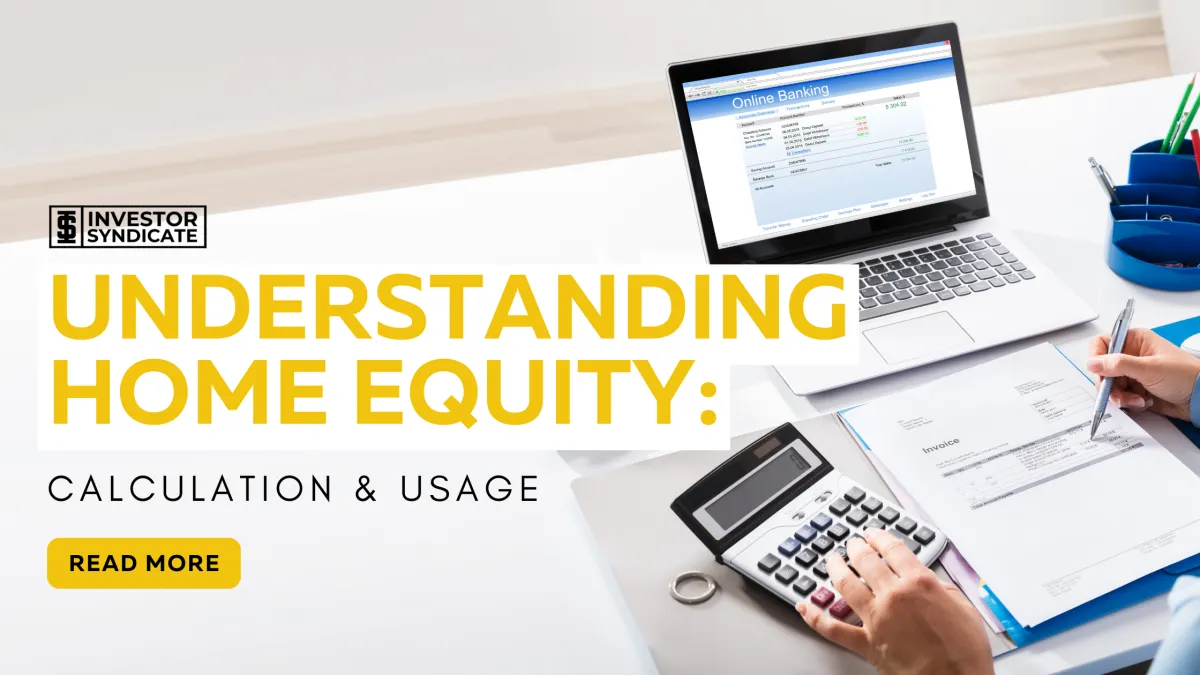Investor Syndicate Blogs
Download The Deal Flipping Playbook

Understanding Property Equity: Calculation & Usage
Introduction
Property equity, also known as home equity, plays a central role in the financial landscape of homeownership, embodying the value that a homeowner holds in their property. It emerges as the difference between the market value of a property and any outstanding debts secured against it, such as mortgages or loans. This equity accrues over time as mortgage payments reduce the outstanding debt and, potentially, as the property value appreciates.

Understanding and managing property equity effectively is crucial, as it can serve as a formidable financial instrument, offering various avenues for homeowners to capitalize on their investment.
Whether it's through securing a home equity loan, facilitating debt consolidation, funding major expenses like home renovations, or even serving as a financial cushion in retirement, the judicious use of property equity can open doors to significant financial opportunities. This guide aims to elucidate the nuances of calculating property equity and explore its versatile uses, underlining its importance as a cornerstone of personal financial strategy.
What is Home Equity?
Home equity, a crucial concept in the realm of real estate and personal finance, is defined as the difference between the current market value of your property and the total amount owed on any mortgage or loans against it. This value essentially represents the actual ownership stake you have in your property, distinguishing it as a significant asset within your financial portfolio. It is an accruing benefit that grows over time as you continue to pay down your mortgage and as the property value appreciates, subject to market conditions.
Home equity is not just a theoretical figure; it holds tangible value and can be leveraged for various financial purposes. This can include obtaining loans such as home equity lines of credit (HELOCs) or home equity loans, which utilize this equity as collateral.
Moreover, in the broader scope of personal wealth management, home equity plays a pivotal role. It serves as a key indicator of financial health and stability, providing homeowners with a source of capital that can be accessed to fund major expenses, invest in other ventures, or plan for retirement. As such, understanding and managing home equity is essential for effective long-term financial planning and wealth accumulation.
Factors Influencing Home Equity
Several factors affect home equity, including market conditions, property improvements, and the duration of mortgage payments. Understanding these factors is crucial in managing and increasing your home equity.
Calculating Home Equity
The calculation of home equity is a straightforward but crucial process for homeowners to understand, as it forms the basis for making informed financial decisions regarding their property. Essentially, this calculation involves a two-step assessment.
First, one must determine the current market value of the property in question. This value is typically ascertained through a professional appraisal, real estate market analyses, or through sophisticated online valuation tools, providing a fairly accurate estimate of what the property would sell for under current market conditions.
The second step involves identifying and summing up any outstanding balances on mortgages or loans secured by the property. This includes the principal balance of the primary mortgage, home equity lines of credit, or any other debts for which the property has been pledged as collateral. By subtracting these liabilities from the property's market value, homeowners arrive at their home equity figure.
This value is more than just a number; it represents the portion of the property that the homeowner truly owns and can significantly impact financial strategies, including refinancing, selling, or leveraging the equity for other investments or expenses. Understanding and monitoring home equity is thus a fundamental aspect of responsible property ownership and financial management.
Assessing Property Value
Determining the current market value of your property can be done through a professional appraisal or comparative market analysis.
Subtracting Mortgage Balances (H3)
Review your mortgage statements to ascertain the total amount remaining on your home loan. This figure, subtracted from the property value, gives your home equity.
Increasing Home Equity
Homeowners possess several strategies to augment the equity in their properties, an essential aspect of financial security and investment in real estate. One of the primary methods is by making larger or additional payments towards their mortgage principal. This approach reduces the outstanding loan balance at a faster rate, thereby increasing the homeowner's equity share in the property.
Another effective method is through property upgrades and renovations. Thoughtful enhancements can significantly raise the property's market value, subsequently boosting the equity. This is particularly beneficial when upgrades align with current market trends and demands.
Additionally, homeowners can benefit from natural market appreciation over time, where the property's value increases due to external market factors, such as developments in the neighborhood or overall economic growth. However, it is crucial for homeowners to approach this aspect with caution, as market trends can fluctuate. Collectively, these methods offer homeowners a proactive way to build and maximize their home equity, serving as a valuable financial resource and contributing to their long-term wealth accumulation.
Making Additional Mortgage Payments
Paying more than the minimum required on your mortgage can accelerate equity growth, as more of your payment goes toward the principal balance.
Home Improvements and Renovations
Investing in home improvements can significantly raise the property's market value, thereby increasing equity.
Using Home Equity Wisely
Home equity, a significant asset in a homeowner's financial portfolio, represents the difference between the market value of a property and the outstanding balance on its mortgage. While it serves as a robust financial resource, leveraging it necessitates careful consideration and judicious use.
Homeowners often tap into their home equity for various purposes, such as obtaining home equity loans or lines of credit. These financial instruments enable homeowners to borrow against the value of their property, often at favorable interest rates compared to other forms of credit.
Additionally, home equity can be a viable option for funding major expenses, including educational pursuits or home renovations, which can further enhance the property's value. However, it's crucial to approach this with a strategic plan, as it involves using one's home as collateral.
Mismanagement or over-leveraging of home equity can lead to financial strain or, in worst-case scenarios, the loss of the property. Therefore, homeowners should carefully assess their financial situation and long-term goals before utilizing home equity to ensure it aligns with their overall financial strategy and capabilities.
Home Equity Loans and Lines of Credit
These financial tools allow you to borrow against your home equity, providing access to large sums at potentially lower interest rates than other forms of credit.
Funding Major Expenses
Home equity can be a resource for financing significant expenditures, but it's essential to consider the long-term implications on your financial health.
Risks and Considerations
While leveraging home equity can offer substantial financial benefits, it is crucial to approach this option with a clear understanding of the associated risks. The most prominent concern is the fluctuation in property values. A decline in the market can lead to a situation where homeowners owe more than their property's worth, a phenomenon known as 'negative equity.'
This not only affects the ability to sell or refinance the home but can also limit access to additional equity-based financing. Additionally, utilizing home equity increases the overall debt load, which could strain the homeowner's financial resources, especially in the face of changing economic conditions or personal financial setbacks.
Furthermore, the most significant risk in tapping into home equity is the potential for foreclosure. Failure to meet the repayment obligations of a home equity loan or line of credit can result in the loss of the home, as these financial products are secured against the property. Therefore, while home equity can be a valuable asset for homeowners, it is imperative to consider these risks carefully and ensure a stable repayment plan to safeguard one's home and financial well-being.
Market Fluctuations
A decline in the real estate market can reduce your home equity, affecting your financial standing.
Debt Management
Borrowing against home equity increases your debt burden, necessitating careful financial planning and management.
Conclusion
Understanding and managing home equity is an essential facet of financial acumen for any homeowner. Home equity, being the value of the homeowner’s interest in their real estate, is more than just a static number—it's a dynamic asset that can be grown and leveraged.
Calculating home equity requires homeowners to assess the current market value of their property and subtract any outstanding mortgage or loan balances. This resultant figure is the tangible expression of their financial stake in the property, a resource that, when utilized strategically, can bolster financial stability.
Astute homeowners can capitalize on this equity, using it for significant financial moves like debt consolidation, home improvements, or even as a robust line of credit for other investments. It's a financial tool that, when managed with prudence, not only reflects a homeowner’s current fiscal health but can also pave the way for securing a prosperous financial future. By making informed decisions based on the equity available in their home, homeowners can navigate the intricacies of personal finance with a greater degree of confidence and foresight.
Contact Us

Bet On Yourself
Empowering real estate investors with the tools they need to scale.






